POSTPONED - The Black Sheep Pub
247 S. 17th Street
Philadelphia, PA 19103
6:00pm
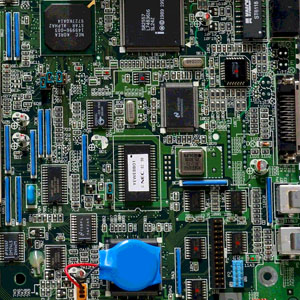 Eric J. Schelter
Eric J. SchelterDepartment of Chemistry, University of Pennsylvania
“POSTPONED - From the Ends of the Earth to Your IPhone: The Hidden Costs of Your Technology”
We are surrounded by technology in modern life, by highly-engineered devices with enormous computing power and memory capacity. At the heart of such technologies are complex materials developed to exacting standards. As the requirements for these materials have become more demanding, the number of chemical elements present in technology has grown. Each smartphone now contains about 75 different chemical elements. But what are they? And where do they come from? In many cases, the mining and purifying of such essential elements is an expensive, labor-intensive, and environmentally devastating process. In this talk, we will examine the supply chains for various ‘critical’ metals and their impact in our daily lives. The environmental and ethical issues around obtaining critical metals will also be discussed. Ultimately, circular supply chains must be developed; we’ll also consider the prospects for such sustainable development.
POSTPONED - Stoney’s British Pub
3007 Concord Pike
Wilmington DE
7:30pm
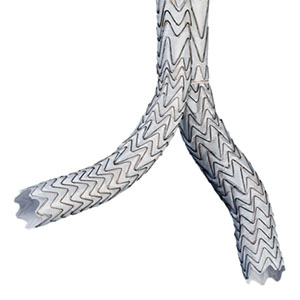 Clifford Warner Ph.D.
Clifford Warner Ph.D.W.L. Gore & Associates
“POSTPONED - The Metallurgy of Stents”
Stent and stent graft devices have revolutionized treatment of cardiovascular disease. Today, many procedures can be performed through small incisions with devices delivered from the end of a catheter. Nitinol and its unique metallurgical properties have been a key enabler to the development of these technologies. Cliff Warner will present the history of the discovery of shape memory alloys, how their unique properties lead to innovations in cardiovascular surgery, and some of the current challenges with these alloys.
Stoney’s British Pub
3007 Concord Pike
Wilmington DE
7:30pm
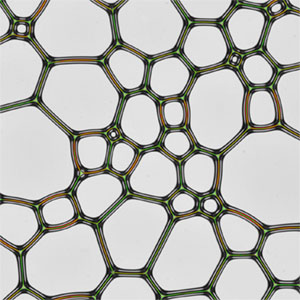 Douglas Durian
Douglas DurianProfessor of Physics, University of Pennsylvania
“The Physics of Foam”
It’s easy to foam up soapy water, but not to understand the surprising properties of foam. How can it be white and solid when it’s made mostly of gas and a little liquid, neither of which is white or solid? Douglas Durian will explain how foams change over time and some of the excitement they offer as a modern research topic in fundamental physics and mathematics.
The Black Sheep Pub
247 S. 17th Street
Philadelphia, PA 19103
6:00pm
 Shu Yang
Shu YangDepartment of Materials Science and Engineering, University of Pennsylvania
“Creating Smart Textiles”
Wearable technology is poised to explode in the next decade. As flexible electronic devices have begun to be incorporated into clothing, there are pressing needs to develop sustainable digital fabrication techniques and functional materials to create smart textiles that could can response environmental changes and embed personal health information.
Here, I will present our work on fabrication of polymer fibers and meter-long yarns with embedded chemical receptors and selective wettability, which can be knitted, embroidered or weaved into wearable prototypes. By control of surface chemistry of the fibers, we demonstrate selective wettability of the yarns, which wicks aqueous solutions, and change colors in response to humidity, pH, and electrolytes. By selective embedding of functional yarns into different geometries, we create multi-sensors and “blooming” flowers that can response to UV light intensity, temperatures, and electrical fields.
Stoney’s British Pub
3007 Concord Pike
Wilmington DE
7:30pm
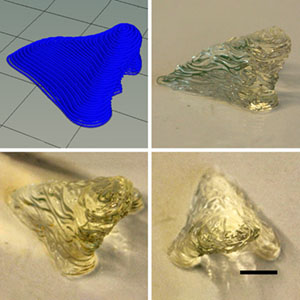 Jason Burdick
Jason BurdickProfessor of Bioengineering, University of Pennsylvania
“Advances in 3D Printing for Medical Applications”
3D printing is a technology that is now revolutionizing many fields, particularly in the manufacturing of materials with desired shapes and structures, often through layer-by-layer fabrication approaches. It is now even feasible to have 3D printers in our homes, using open-source software and low-cost materials. One area where 3D printing is now making an impact is in the treatment of patients. This includes the construction of prosthetic devices, the fabrication of hard implants (particularly in dentistry and orthopedics), and the design of surgical guides and models. This field is now evolving towards 3D BIOprinting, where materials are combined with cells towards the fabrication of biological structures that may be useful in the repair and regeneration of tissues, or as disease models for applications in drug screening. In this presentation, I will discuss general advances in 3D printing in medicine, as well as the various 3D printing techniques that are being developed in this area. Further, I will focus on how 3D printing is now being advanced to fabricate complex biological tissues with the potential as patient therapies.
The Black Sheep Pub
247 S. 17th Street
Philadelphia, PA 19103
6:00pm
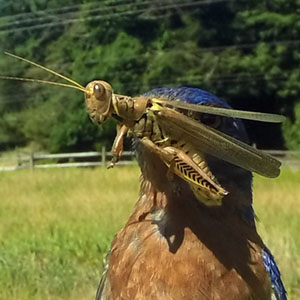 Ashley Kennedy
Ashley KennedyPostdoctoral Fellow, United States Army Public Health Center
“Living Materials: What the ‘Insect Apocalypse’ Means for You and Your Yard”
Numerous studies from around the world suggest that insect populations are currently in decline. This in turn affects birds who rely on insects as food, especially during the breeding season. To determine which insects are most important in bird diets, I conducted a citizen science project to crowd-source images of birds with their arthropod prey. More than 7,000 photos were contributed by participants across North America, demonstrating that caterpillars are the preferred prey for most terrestrial breeding birds. Come learn how you can help reverse alarming trends in arthropod and bird populations by converting your yard into better wildlife habitat for these groups!
The Black Sheep Pub
247 S. 17th Street
Philadelphia, PA 19103
6:00pm
 Jason Burdick
Jason BurdickProfessor of Bioengineering, University of Pennsylvania
“Advances in 3D Printing for Medical Applications”
3D printing is a technology that is now revolutionizing many fields, particularly in the manufacturing of materials with desired shapes and structures, often through layer-by-layer fabrication approaches. It is now even feasible to have 3D printers in our homes, using open-source software and low-cost materials. One area where 3D printing is now making an impact is in the treatment of patients. This includes the construction of prosthetic devices, the fabrication of hard implants (particularly in dentistry and orthopedics), and the design of surgical guides and models. This field is now evolving towards 3D BIOprinting, where materials are combined with cells towards the fabrication of biological structures that may be useful in the repair and regeneration of tissues, or as disease models for applications in drug screening. In this presentation, I will discuss general advances in 3D printing in medicine, as well as the various 3D printing techniques that are being developed in this area. Further, I will focus on how 3D printing is now being advanced to fabricate complex biological tissues with the potential as patient therapies.
Stoney’s British Pub
3007 Concord Pike
Wilmington DE
 Ashley Kennedy
Ashley KennedyPostdoctoral Fellow, United States Army Public Health Center
“Living Materials: What the ‘Insect Apocalypse’ Means for You and Your Yard”
Numerous studies from around the world suggest that insect populations are currently in decline. This in turn affects birds who rely on insects as food, especially during the breeding season. To determine which insects are most important in bird diets, I conducted a citizen science project to crowd-source images of birds with their arthropod prey. More than 7,000 photos were contributed by participants across North America, demonstrating that caterpillars are the preferred prey for most terrestrial breeding birds. Come learn how you can help reverse alarming trends in arthropod and bird populations by converting your yard into better wildlife habitat for these groups!
The Black Sheep Pub
247 S. 17th Street
Philadelphia, PA 19103
6:00pm
 Zahra Fakhraai
Zahra FakhraaiAssociate Professor of Chemistry, University of Pennsylvania
“Slowing Time to Make Burn-Resistant Polymers”
Most polymers, long-chain molecules, burn when exposed to heat by breaking into smaller bits and then reacting with oxygen. This process can rapidly accelerate as the chains break into shorter bits and generate fires, leaving behind a black goo of carbonized material. This is a major problem for using some commodity polymers in building materials, batteries, and other applications where the polymer can become really hot. By confining the polymers into a film of nanoparticles, we can slow-down the motion of the polymer as well as oxygen motion into the polymer. This process effectively slows down time for the system, reducing the rate at which the chain can interact with oxygen and make it impossible for the polymer to catch fire.
The Black Sheep Pub
3007 Concord Pike
Wilmington, DE
7:30pm
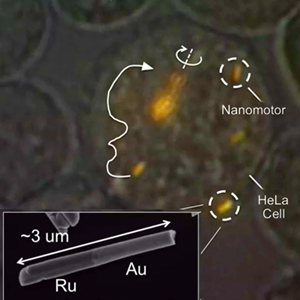 Thomas E. Mallouk
Thomas E. MalloukUniversity of Pennsylvania
“How Do You Make a Micro-Robot?”
Engines and motors are everywhere in the modern world, but it is a challenge to make them work if they are very small. On the micron length scale, inertial forces are weak and so conventional motor designs involving, e.g., pistons or flywheels cease to function. Biological motors work by a different principle and use catalysis to convert chemical to mechanical energy. Together with Ayusman Sen and other colleagues at Penn and Penn State we are exploring the use of chemical forces to power synthetic microswimmers and pumps. This talk will describe some of the unexpected lessons learned in pursuing this simple idea, as well as emerging applications.
Stoney’s British Pub
3007 Concord Pike
Wilmington DE
7:30pm
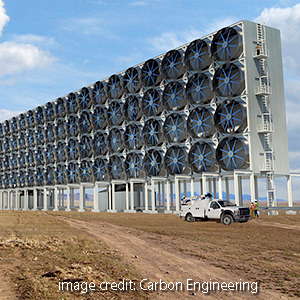 Eric A. Stach
Eric A. StachUniversity of Pennsylvania
“Negative Emissions Technologies for a Carbon-Neutral World”
Despite global efforts to limit terrestrial warming to 1.5°C (or perhaps 2.0°C), there is increasing evidence that this goal will not likely be met. This places increased emphasis on the development of new technologies to actively capture CO2 emissions in an effort to remove them from the atmosphere. In this presentation, I will talk about research and development needs for specific technologies that are being pursued to convert CO2 to useful chemicals. This is just one part of what must be done, but it represents an interesting convergence of multiple science and engineering challenges and hopefully will be an interesting discussion for a Science Café!
The Black Sheep Pub
247 S. 17th Street
Philadelphia, PA 19103
6:00pm
 Thomas E. Mallouk
Thomas E. MalloukUniversity of Pennsylvania
“How Do You Make a Micro-Robot?”
Engines and motors are everywhere in the modern world, but it is a challenge to make them work if they are very small. On the micron length scale, inertial forces are weak and so conventional motor designs involving, e.g., pistons or flywheels cease to function. Biological motors work by a different principle and use catalysis to convert chemical to mechanical energy. Together with Ayusman Sen and other colleagues at Penn and Penn State we are exploring the use of chemical forces to power synthetic microswimmers and pumps. This talk will describe some of the unexpected lessons learned in pursuing this simple idea, as well as emerging applications.
The Black Sheep Pub
247 S. 17th Street
Philadelphia, PA 19103
6:00pm
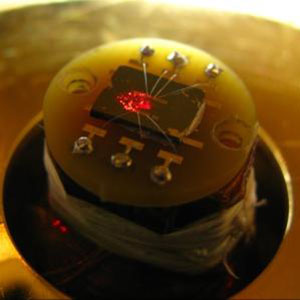 Ritesh Agarwal
Ritesh AgarwalUniversity oof Pennsylvania
“Silicon Nanophotonics: Using Light to Speed up Computers”
In this talk I will briefly review the amazing progress made in the area of computer technology outlining some key advances leading to the development of modern computers. However, in order to continue the same rate of progress, we have to find new ways to make Silicon, a workhorse material in our computers perform new tricks or be able to integrate new technologies on a Silicon platform. This also includes new materials and devices that can perform the functions required for quantum computing technologies. I will motivate the use of light in making our computers faster and to do so, we will have to learn how to make Silicon emit light and perform basic computing functions, especially at the nanoscale. We will also discuss how more information can be encoded in light to assemble optical communication systems that can process much more information than what is possible with current technologies. Some of the ideas that are being pursued in my research group in enabling Silicon-based nanophotonics will be discussed along with how such nanodevices can also be used for quantum computers.
Stoney’s British Pub
3007 Concord Pike
Wilmington DE
7:30pm
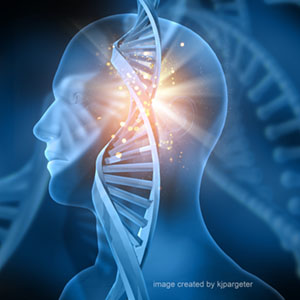 Erin Crowgey
Erin CrowgeyNemours Alfred I. DuPont Hospital for Children
“Translational Bioinformatics and Genomics”
Precision medicine continues to be a driving force for utilizing complex genomic data at the bedside, and analyses of these high-density data requires high-performance computing workflows. Advancements in DNA sequencing technology and computing capabilities have propelled the use of genetic and genomic data in precision medicine efforts. The Nemours Center for Cancer and Blood Disorders (NCCBD) is actively developing new techniques in genomic sequencing that are enabling the diagnosis of rare diseases and improving our understanding of pediatric cancers. Dr. Crowgey will present on these translational research efforts and how bioinformatics is driving new technologies.
